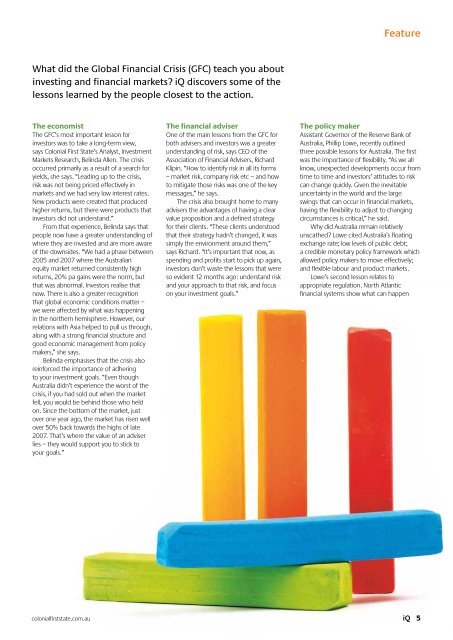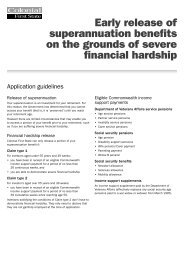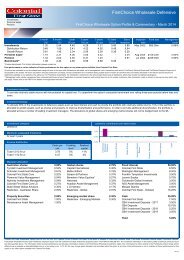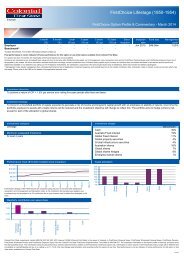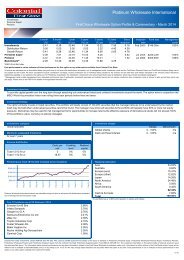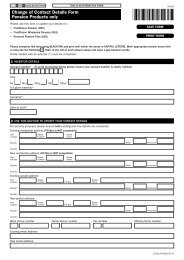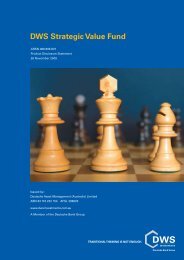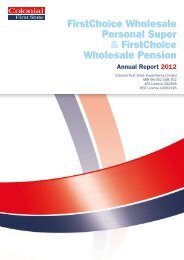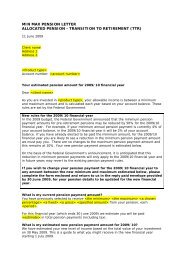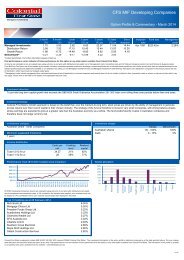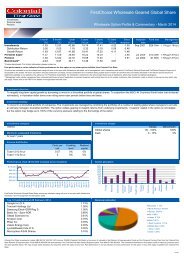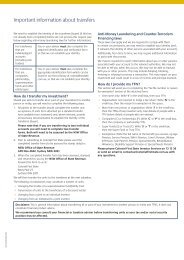Life after the Global Financial Crisis - Colonial First State
Life after the Global Financial Crisis - Colonial First State
Life after the Global Financial Crisis - Colonial First State
Create successful ePaper yourself
Turn your PDF publications into a flip-book with our unique Google optimized e-Paper software.
FeatureWhat did <strong>the</strong> <strong>Global</strong> <strong>Financial</strong> <strong>Crisis</strong> (GFC) teach you aboutinvesting and financial markets? iQ discovers some of <strong>the</strong>lessons learned by <strong>the</strong> people closest to <strong>the</strong> action.The economistThe GFC’s most important lesson forinvestors was to take a long-term view,says <strong>Colonial</strong> <strong>First</strong> <strong>State</strong>’s Analyst, InvestmentMarkets Research, Belinda Allen. The crisisoccurred primarily as a result of a search foryields, she says. “Leading up to <strong>the</strong> crisis,risk was not being priced effectively inmarkets and we had very low interest rates.New products were created that producedhigher returns, but <strong>the</strong>re were products thatinvestors did not understand.”From that experience, Belinda says thatpeople now have a greater understanding ofwhere <strong>the</strong>y are invested and are more awareof <strong>the</strong> downsides. “We had a phase between2005 and 2007 where <strong>the</strong> Australianequity market returned consistently highreturns, 20% pa gains were <strong>the</strong> norm, butthat was abnormal. Investors realise thatnow. There is also a greater recognitionthat global economic conditions matter –we were affected by what was happeningin <strong>the</strong> nor<strong>the</strong>rn hemisphere. However, ourrelations with Asia helped to pull us through,along with a strong financial structure andgood economic management from policymakers,” she says.Belinda emphasises that <strong>the</strong> crisis alsoreinforced <strong>the</strong> importance of adheringto your investment goals. “Even thoughAustralia didn’t experience <strong>the</strong> worst of <strong>the</strong>crisis, if you had sold out when <strong>the</strong> marketfell, you would be behind those who heldon. Since <strong>the</strong> bottom of <strong>the</strong> market, justover one year ago, <strong>the</strong> market has risen wellover 50% back towards <strong>the</strong> highs of late2007. That’s where <strong>the</strong> value of an adviserlies – <strong>the</strong>y would support you to stick toyour goals.”The financial adviserOne of <strong>the</strong> main lessons from <strong>the</strong> GFC forboth advisers and investors was a greaterunderstanding of risk, says CEO of <strong>the</strong>Association of <strong>Financial</strong> Advisers, RichardKlipin. “How to identify risk in all its forms– market risk, company risk etc – and howto mitigate those risks was one of <strong>the</strong> keymessages,” he says.The crisis also brought home to manyadvisers <strong>the</strong> advantages of having a clearvalue proposition and a defined strategyfor <strong>the</strong>ir clients. “These clients understoodthat <strong>the</strong>ir strategy hadn’t changed, it wassimply <strong>the</strong> environment around <strong>the</strong>m,”says Richard. “It’s important that now, asspending and profits start to pick up again,investors don’t waste <strong>the</strong> lessons that wereso evident 12 months ago: understand riskand your approach to that risk, and focuson your investment goals.”The policy makerAssistant Governor of <strong>the</strong> Reserve Bank ofAustralia, Phillip Lowe, recently outlinedthree possible lessons for Australia. The firstwas <strong>the</strong> importance of flexibility. “As we allknow, unexpected developments occur fromtime to time and investors’ attitudes to riskcan change quickly. Given <strong>the</strong> inevitableuncertainty in <strong>the</strong> world and <strong>the</strong> largeswings that can occur in financial markets,having <strong>the</strong> flexibility to adjust to changingcircumstances is critical,” he said.Why did Australia remain relativelyunsca<strong>the</strong>d? Lowe cited Australia’s floatingexchange rate; low levels of public debt;a credible monetary policy framework whichallowed policy makers to move effectively;and flexible labour and product markets.Lowe’s second lesson relates toappropriate regulation. North Atlanticfinancial systems show what can happencolonialfirststate.com.au iQ 5


